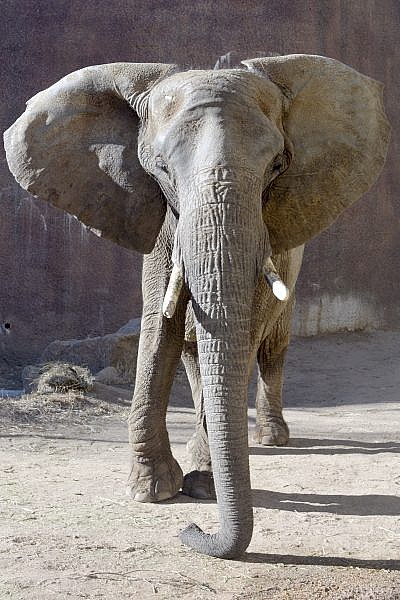Colorado Springs, Colo. – This morning, a team of Cheyenne Mountain Zoo staff used specialized equipment to successfully assist Malaika, a 33-year-old African elephant, who was found lying on her side during an overnight check. If an elephant can’t get up on its own and is down for too long, it can cause stress to its internal organs and can be fatal. The team responded in the early-morning hours to mobilize a specialized crane-and-hoist system in the barn to help the elephant to her feet, since she was unable to stand on her own.
The team was made up of more than 20 cross-discipline Zoo staff members, including Malaika’s animal keepers, veterinary staff, maintenance and grounds personnel, The Colorado Springs Fire Department Heavy Rescue team, Broadmoor Fire Department, and more.
The Zoo’s emergency response team was able to use the barn’s hoist system to help Malaika into a sternal position (on her belly, with legs in a better position to stand). Malaika was then able to stand on her own, with the hoist strap still in place for support, at 6:47 a.m. Since then, her care team, including her keepers and veterinary staff, have been monitoring her for any additional medical concerns. She is drinking electrolyte water, eating some of her favorite treats, and taking medication for inflammation and pain.
Malaika has a history of not being able to get back up from laying down, and had to be rescued once before, on Jan. 1, 2018. Some elephants are able to lie down and get back up with no problem, but some, like Malaika, don’t ever lie down and instead just lean on objects for rest. This is partially due to a life-long issue with bowing and lack of strength in her back right leg, which is worsening as she ages.
Because of Malaika’s history, Zoo staff monitor her throughout the day and with checks every two hours overnight. Our monitoring system shows that Malaika went down around 3:45 a.m., from what appears to be a leg wobble during a deep sleep. She was discovered down during the 5 a.m. check. A core Zoo team was assembled at the elephant barn between 5:30 and 5:45 a.m., with a full team on-site by 6 a.m. Protocols were immediately put into place to help her stand.
The Zoo cares for an aging female elephant herd, so the barn is equipped with state-of-the-art equipment that helps address the inevitable complications that come with multi-ton animals that need medical assistance. Equipment includes a remote video surveillance system for animal care staff to monitor the elephants, the crane-and-hoist system that can lift a disabled elephant and a care system that provides a safe area for weighing, veterinary care and husbandry training. Outdoor wellness features of the exhibit include an exercise path, built-in enrichment activities, a pool and a spacious vacation yard, where our elephants can take time to roam and explore by themselves.
Zoo staff performs drills to practice and test protocols for situations like these. The last “down elephant” drill occurred in January 2019, which is likely one reason the procedure to help Malaika today ran as successfully as it did.
About Cheyenne Mountain Zoo
Cheyenne Mountain Zoological Society was founded in 1926. Today, Cheyenne Mountain Zoo, America’s only mountain zoo, offers comprehensive education programs, exciting conservation efforts and truly fantastic animal experiences. It is Cheyenne Mountain Zoo’s hope that guests fall in love with animals and nature, and take action to protect them. Of the 233 zoos and aquariums accredited by the Association of Zoos and Aquariums (AZA), Cheyenne Mountain Zoo is one of just ten operating without tax support. Cheyenne Mountain Zoo depends on admissions, membership dues, special event attendance and donations for funding.

